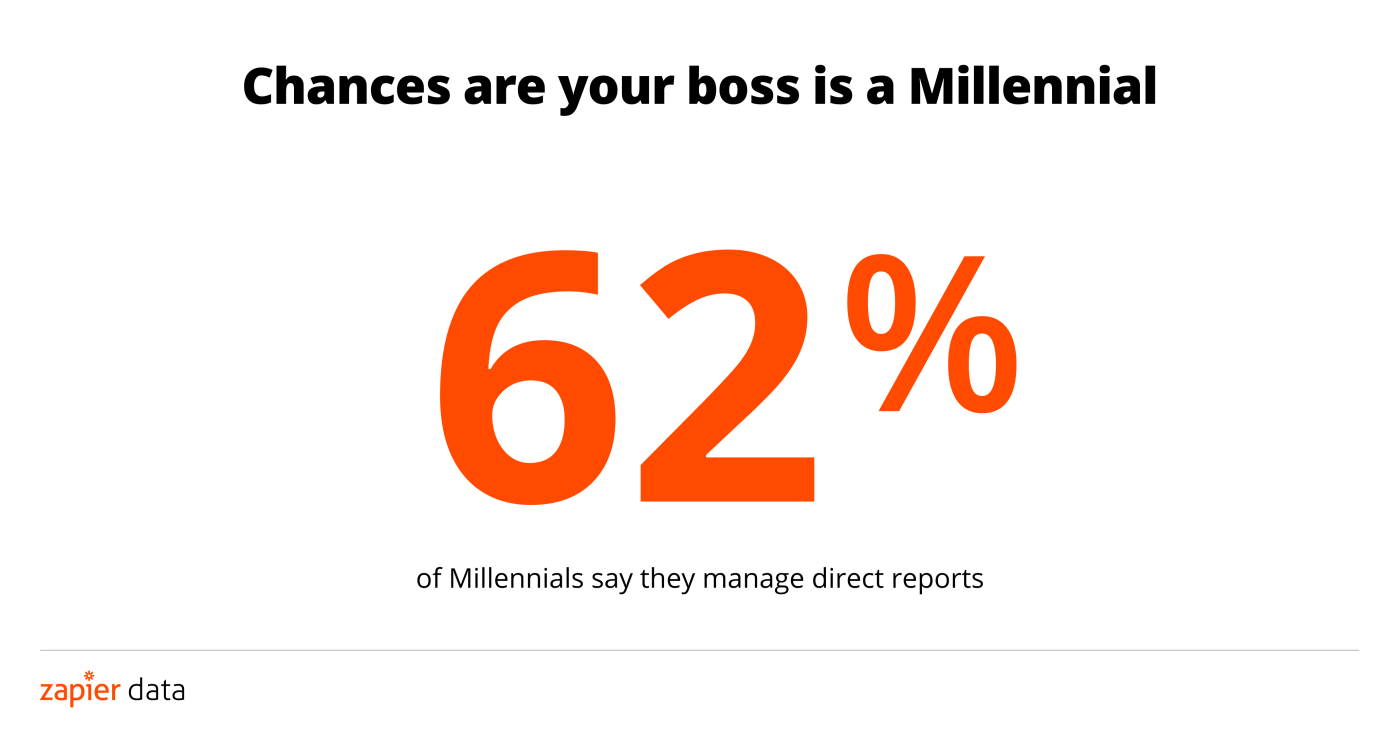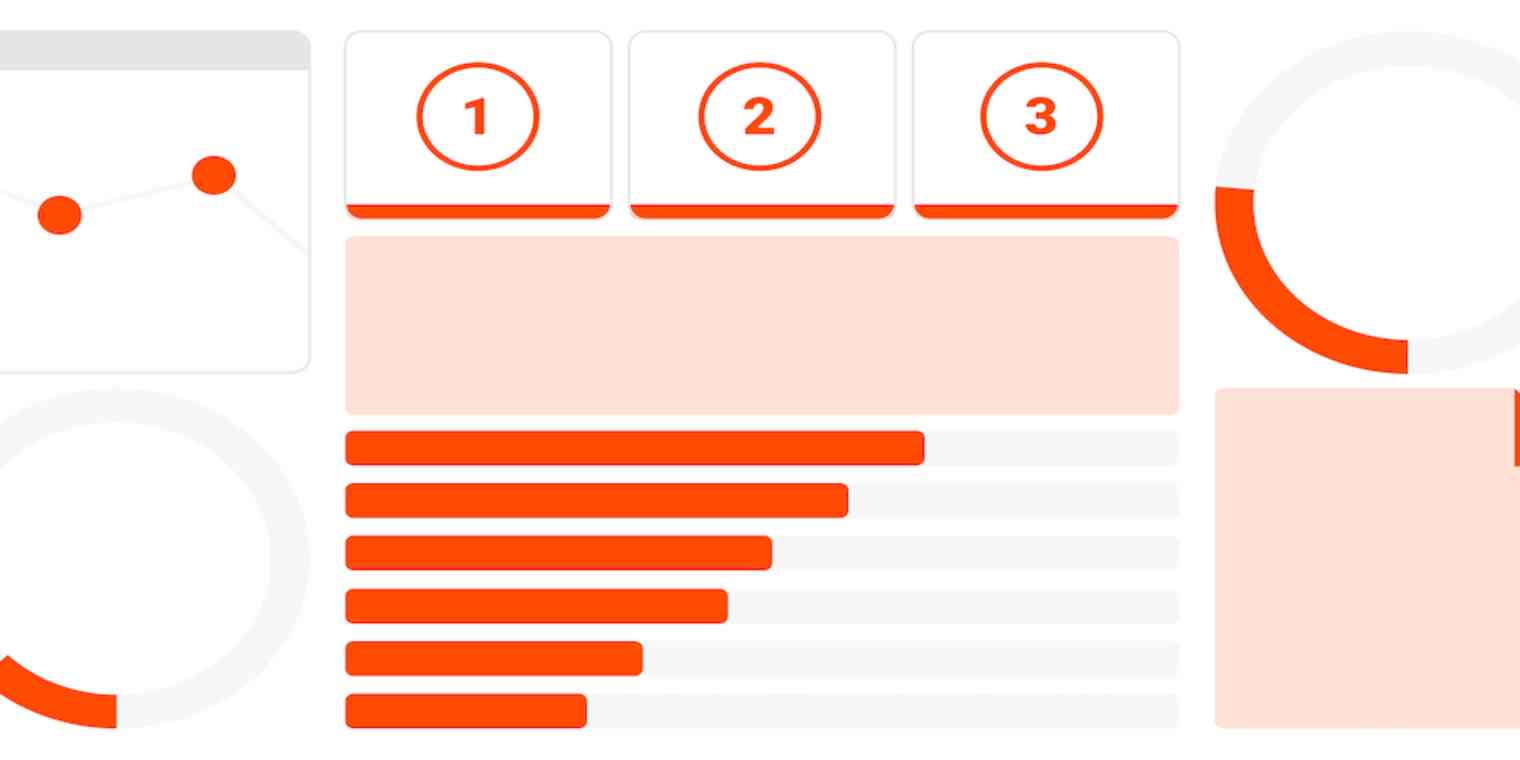Millennials aren't that young anymore. The generation is currently between 24 and 39 years old, meaning some Millennials are nearly two decades into their career. These aren't just the future leaders of industry—they're already running the show as managers. Gen Z, between 18 and 23 years old, is also entering the workforce en masse. These two generations, all digital natives, are going to shape the workplaces of the future.
We wanted an idea of what that will look like, so we commissioned The Harris Poll to conduct an online survey among a cross-section of Millennial and Gen Z U.S. workers.
Younger generations aren't just in the workplace—they're increasingly running it
A majority of Millennial employees have at least one direct report, meaning they're people managers. Gen Z isn't far behind on that front, though Gen Z women, in particular, may be having a harder time becoming managers.

More than 3 in 5 Millennial employees (62 percent) and nearly half of Gen Z employees (49 percent) say they have direct reports.
Male Gen Z employees are almost twice as likely as female Gen Z employees to say they have direct reports (62 percent vs. 33 percent).
Female Millennial employees are more likely than female Gen Z employees to say they have direct reports (58 percent vs. 33 percent).
The majority of Millennials see people management as the only way to advance their careers
Why do Millennials become managers? Most feel like it's the only path to career advancement or earning more money. That's particularly true of Millennial men, who overwhelmingly move into management to earn more money or advance their career.

The number one reason Millennials moved into a management role with direct reports is that it was the only way to earn more money or advance in their career (61 percent). Additionally, more than 2 in 5 Millennial managers cite it was that they wanted more responsibility or that they were passionate about the responsibilities of the role (46 percent each). Fewer say it was because they worked for someone who inspired them to become a manager (27 percent) or that someone else left and there was no one else to fill the role (13 percent).
Gen Z managers are twice as likely as Millennial managers to say they moved into a management role because someone else left and there was no one else to fill the role (27 percent vs. 13 percent).
Male millennial managers are more likely than female millennial managers to say they moved into a management role because it was the only way to earn more money or advance in their career (70 percent vs. 48 percent).
Young managers are burned out, constantly working, and low-key thinking of ghosting
Many young managers are burned out, which could be in part because they struggle with delegating. A widespread culture of responding to work communications outside work hours probably isn't helping either.

73 percent of millennial managers and 66 percent of Gen Z managers have experienced periods of decreased productivity at work due to job burnout.
About 2 in 5 Gen Z managers (42 percent) and almost one-third of Millennial managers (32 percent) say they struggle with delegating work to their direct reports.
Roughly two-thirds of Gen Z employees (66 percent) and almost 3 in 5 Millennial employees (57 percent) say they expect their teammates to respond to them outside of work hours.
- Male Gen Z employees are more likely than female Gen Z employees to feel this way (74 percent vs. 56 percent). - Gen Z managers are more likely than Millennial managers to feel this way (77 percent vs. 63 percent).Managers are more likely to ghost you:
- When asked about ghosting an employer (e.g., quitting without giving any notice), Gen Z Managers were almost twice as likely as Gen Z non-managers to say they would not feel guilty doing so (48 percent vs. 26 percent). And Millennial managers were more likely than Millennial non-managers to admit the same thing (46 percent vs. 25 percent).
Younger employees value managers with soft skills
Millennial and Gen Z employees value managers who communicate clearly and increase productivity. Driving results and managing budgets are lower priorities.

Younger generations say skills that focus on people, rather than business, make for good managers. The skills Gen Z and Millennial employees feel are among the most important for being a people manager are: _Communication skills (66 percent and 69 percent, respectively) _The ability to make a team more productive/efficient (63 percent and 61 percent, respectively) _The ability to motivate employees (63 percent and 60 percent, respectively)._Conflict resolution skills (51 percent and 55 percent, respectively) _Strategic planning skills (56 percent and 48 percent, respectively) _The ability to delegate work (46 percent each)_The ability to drive results for the business (42 percent and 37 percent, respectively) _Budget management skills (30 percent and 33 percent, respectively)
Female Gen Z employees are much more likely than male Gen Z employees to think communication skills (81 percent vs. 54 percent) and conflict resolution skills (60 percent vs. 43 percent) are among the most important skills for being a people manager.
Methodology: This survey was conducted online within the United States by The Harris Poll on behalf of Zapier from January 8-10, 2020 among 519 Gen Z U.S. adults ages 18-23 and 519 Millennial U.S. adults ages 24-39. This online survey is not based on a probability sample and therefore no estimate of theoretical sampling error can be calculated. Results were weighted for age within gender, region, race/ethnicity, income, and education where necessary to align them with their actual proportions in the population. Propensity score weighting was also used to adjust for respondents’ propensity to be online. All sample surveys and polls, whether or not they use probability sampling, are subject to multiple sources of error which are most often not possible to quantify or estimate, including sampling error, coverage error, error associated with nonresponse, error associated with question wording and response options, and post-survey weighting and adjustments. Therefore, Harris Poll avoids the words "margin of error" as they are misleading. All that can be calculated are different possible sampling errors with different probabilities for pure, unweighted, random samples with 100% response rates. These are only theoretical because no published polls come close to this ideal.
Respondents for this survey were selected from among those who have agreed to participate in online surveys. The data have been weighted to reflect the composition of the adult population. Because the sample is based on those who agreed to participate in our panel, no estimates of theoretical sampling error can be calculated.



